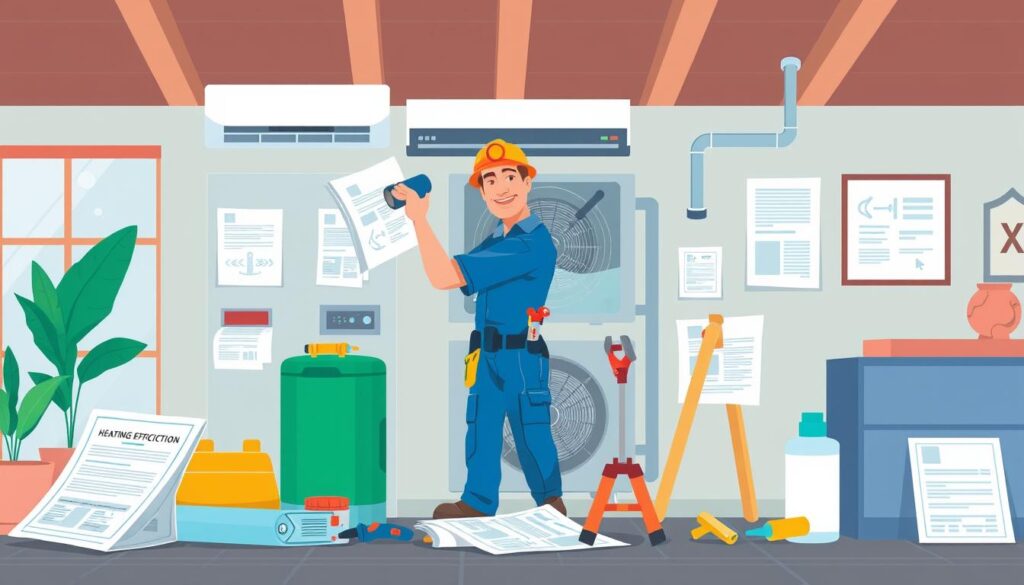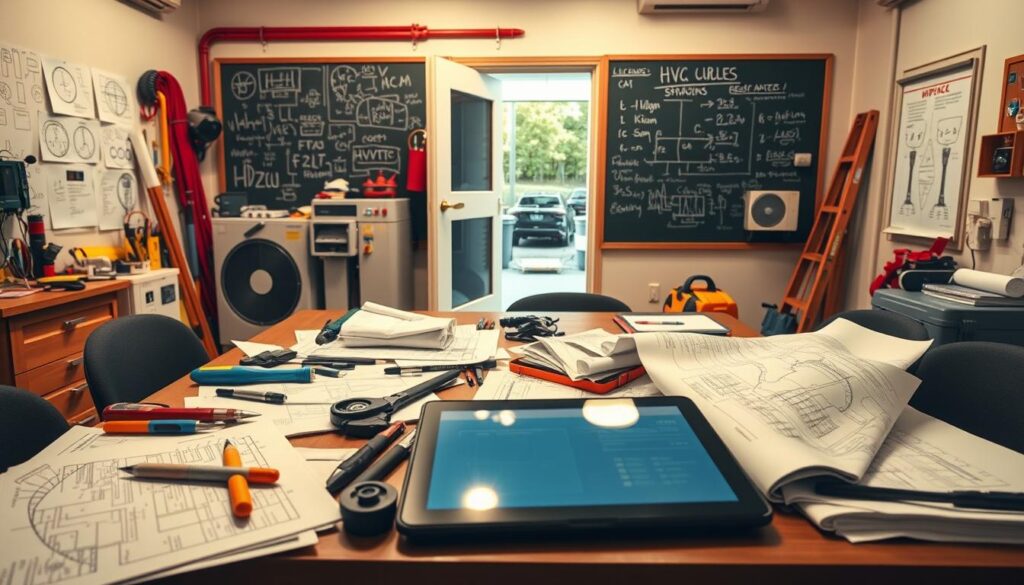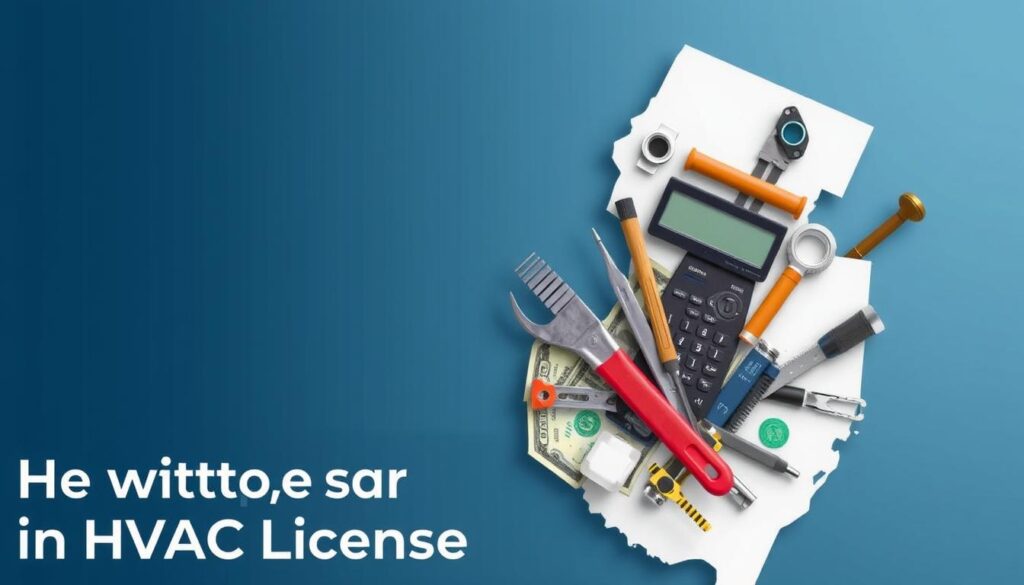Affiliate Disclosure
HVAC Guide Guys is a participant in the Amazon Services LLC Associates Program, an affiliate advertising program designed to provide a means for sites to earn advertising fees by advertising and linking to Amazon.
Do You Need HVAC License in NJ? As a homeowner or business owner in New Jersey, you value a comfortable and efficient indoor space. But did you know New Jersey has strict rules for HVAC professionals? Understanding HVAC licensing in New Jersey can seem tough. But don’t worry, this guide will walk you through it, ensuring your HVAC system is handled by experts.

Key Takeaways
- New Jersey requires a Master HVACR Contractor License to perform HVAC services legally in the state.
- The state has uniform licensing requirements, and local jurisdictions cannot impose additional examinations or fees.
- HVAC professionals must meet specific educational, experience, and examination requirements to obtain the necessary license.
- Proper licensing, insurance, and bonding are essential for HVAC contractors to operate in New Jersey.
- The HVAC industry in New Jersey offers competitive salaries and opportunities for career growth.
Table of Contents
Understanding HVAC Licensing Requirements in New Jersey
Getting a grip on HVAC licensing in New Jersey is key for those aiming to thrive in the field. The New Jersey Division of Consumer Affairs oversees HVAC licensing. They aim to keep the public safe and follow state laws.
State-Level Regulation Overview
The State Board of Examiners of HVACR Contractors manages HVAC licensing in New Jersey. Anyone working on HVAC systems must have a license or work under a licensed contractor’s watch. This rule applies to both employees and independent contractors, showing how vital licensing is in the state.
The Role of NJ Division of Consumer Affairs
The New Jersey Division of Consumer Affairs is vital in the HVAC licensing process. They handle license applications, exams, and enforce state rules. Their work ensures HVAC pros meet the needed standards and work safely.
Who Needs an HVAC License
In New Jersey, anyone working on HVAC systems needs a license. This includes both employees and independent contractors. Not having a license or working without supervision can lead to legal trouble and public safety risks. It’s crucial to follow the state’s HVAC licensing laws to work in this field.
Do You Need HVAC License in NJ?
If you want to work as an HVAC technician in New Jersey, the answer is yes. You need a valid HVAC license. The nj hvac license exam and licensing process are required for HVAC services in the Garden State.
The main HVAC license in New Jersey is the Master HVACR Contractor License. It lets professionals work on heating, ventilation, air conditioning, and refrigeration systems. They can also run an HVAC contracting business. To get this license, you need to meet certain education and experience needs, pass the nj hvac license exam with a 70% score, and have insurance and bonds.
The nj hvac license renewal is also key for HVAC pros in New Jersey. Licenses end on June 30 of even years. To renew, you must pay a $160 fee and complete five hours of continuing education every two years to keep your license.
“Getting an HVAC license in New Jersey is vital for any professional in the HVAC field. It makes sure technicians have the right skills and knowledge to offer top-notch services to homes and businesses.”
Not following New Jersey’s HVAC licensing rules can lead to big fines and legal trouble. So, HVAC pros in New Jersey should know the licensing process well. They must make sure they meet all the requirements to work legally and ethically in the industry.
Types of HVAC Licenses Available in New Jersey
In New Jersey, there’s only one HVAC license: the Master HVACR Contractor License. The New Jersey Division of Consumer Affairs issues it. It’s needed for HVAC installation, maintenance, and repair work.
Master HVACR Contractor License Requirements
To get a Master HVACR Contractor License in New Jersey, you must:
- Be at least 21 years old
- Be a U.S. citizen or legal resident
- Meet certain education and experience standards
Educational Prerequisites
To meet education needs, HVAC contractors in New Jersey can choose from three options:
- Finish a four-year HVACR apprenticeship program
- Get a bachelor’s degree in HVACR technology or engineering
- Have a two-year HVACR degree and one year of journeyperson experience
Experience Requirements
Applicants for the Master HVACR Contractor License also need specific work experience:
- One to three years of journeyperson-level experience, depending on education
- Experience in installing, maintaining, and repairing HVAC systems
The exact experience needed varies by education. But all must show a solid understanding of HVAC principles and practices.
Steps to Obtain Your NJ HVAC License
To get an HVAC license in New Jersey, you need to follow a few steps. First, you must be at least 18 years old and have a high school diploma or GED. You also need to finish any technical or vocational training required by the state.
Then, you must get the needed work experience. This can be done through an apprenticeship or by working under a licensed HVAC professional for a certain number of hours.
- Apply for the examination and pay the $100 application fee.
- Pass both the NJ HVACR Trade and NJ Business and Law exams. The Trade exam has 50 questions to be done in 130 minutes, needing a 70% score. The Business and Law exam also has 50 questions and a 130-minute time limit, with a 70% passing requirement.
- Pay the $160 licensing fee, secure a $3,000 surety bond, obtain $500,000 in general liability insurance, and acquire a Federal Tax Identification number.
- Receive your NJ Master HVACR Contractor License, which is valid for 2 years.
Also, remember to renew your license every 2 years. You’ll need to complete 5 hours of continuing education to do this. By following these steps, you can get your HVAC license in New Jersey and start a career in this field.
| Requirement | Details |
|---|---|
| Application Fee | $100 (online payment only) |
| Licensing Fees | $160, to be paid once the application is approved and the examination is passed and completed |
| License Validity | 2 years |
| Renewal Fees | $160 |
| Surety Bond | $3,000 |
| Liability Insurance | $500,000 |
| Continuing Education | 5 hours before renewal |
By completing these steps, you can get your NJ HVAC license and start a rewarding career in the hvac license courses nj industry. Keep up with the latest requirements and regulations to make the licensing process smooth.
Education and Training Pathways
Aspiring HVAC professionals in New Jersey have many educational paths to choose from. You can opt for an apprenticeship, technical school, or a college degree. Each option offers a way to start your HVAC career.
Apprenticeship Programs
Apprenticeships are a great way to get real-world experience in HVAC. You’ll spend 2,000 hours on the job and 144 hours in class each year for 4-5 years. You’ll learn from experts and earn money while you train.
Technical School Options
New Jersey has many technical schools and community colleges with HVACR programs. These programs can help meet apprenticeship requirements. They mix theory and practical skills for a well-rounded education.
College Degree Programs
New Jersey’s colleges and universities offer bachelor’s degrees in HVACR or related fields. These programs go deep into HVAC science, engineering, and business. They prepare you for leadership and advanced technical roles.
No matter your choice, New Jersey offers many chances to get hvac license training nj and hvac certification nj. These are key to success in the HVAC industry.
HVAC License Examination Process
To get an HVAC license in New Jersey, you must pass two exams. These are the Master HVACR Contractor exam and the Business and Law exam. You need to score at least 70% on each to pass.
The Master HVACR Contractor exam has 50 questions. You have 130 minutes to finish it. It tests your knowledge in electrical systems, piping, heating, cooling, refrigerants, and load calculations.
The Business and Law exam also has 50 questions. You have 130 minutes to complete it. It covers business organization, licensing, estimating, contract management, and labor law.
Before renewing your license, New Jersey requires HVAC professionals to take 5 hours of continuing education. This keeps them updated with the latest industry standards and practices.
| Exam | Questions | Time Limit | Passing Score |
|---|---|---|---|
| Master HVACR Contractor | 50 | 130 minutes | 70% |
| Business and Law | 50 | 130 minutes | 70% |
The nj hvac license exam and hvac license nj laws are key for HVAC professionals in New Jersey. Passing these exams shows you have the technical and business skills needed to excel in the field.

Insurance and Bonding Requirements
In New Jersey, HVAC contractors must follow strict insurance and bonding rules. These rules help protect customers and keep contractors professional.
Liability Insurance Coverage
HVAC contractors in New Jersey need to have at least $500,000 in liability insurance. This policy covers the contractor and the customer if accidents or damage happen during the HVAC work.
Surety Bond Requirements
Contractors also need a $3,000 surety bond. This bond is a financial promise that the contractor will follow nj hvac contractor license laws. It must be ready before the license is given and kept for the whole license time.
The hvac license nj laws surety bond costs $50 a year or $5 a month. This is a small price for contractors to pay. Having these insurance and bonding rules lets contractors work with confidence and give customers peace of mind.
“Proper insurance and bonding requirements protect both HVAC contractors and their customers, ensuring a high level of professionalism and accountability in the industry.”
License Costs and Financial Considerations
Aspiring HVAC professionals in New Jersey face a range of financial obligations when obtaining their licenses. The process can be quite costly. Fees cover everything from the initial application to the mandatory surety bond and liability insurance coverage.
The total cost of obtaining an nj hvac license in New Jersey can quickly add up. The application fee is $100, and the exams required for the license cost $126 in total. The initial license fee is $160, and HVAC contractors must also secure a $3,000 surety bond and maintain liability insurance coverage up to $500,000.
Beyond these core licensing expenses, hvac certification nj seekers may also incur additional costs for their education and training. This can include tuition for apprenticeship programs, technical school coursework, or college degree programs.
The good news is that the nj hvac license cost is a one-time investment. The license must be renewed every two years, with a renewal fee of $160. HVAC technicians in New Jersey are also required to complete five credits of continuing education from Board-approved courses during each biennial period to maintain their license.
| Expense | Cost |
|---|---|
| Application Fee | $100 |
| Exam Fees | $126 |
| Initial License Fee | $160 |
| Surety Bond | $3,000 |
| Liability Insurance | Up to $500,000 |
| License Renewal (every 2 years) | $160 |
While the upfront costs may seem daunting, obtaining an HVAC license in New Jersey is a critical investment in your career. The licensing process ensures that HVAC professionals meet the state’s rigorous standards. This ultimately benefits both the industry and consumers. By understanding the financial considerations, aspiring HVAC technicians can better plan for and navigate the path to licensure.

HVAC Career Opportunities and Salary Potential
The HVAC industry in New Jersey is booming. It has the ninth-highest salary for HVAC mechanics and installers in the U.S. HVAC technicians in New Jersey make an average of $66,980 a year. This makes it a great choice for those looking for good pay.
Salaries in HVAC depend on experience and skills. HVAC Installers in New Jersey earn an average of $28.99 per hour, while HVAC Technicians and HVAC Mechanics command $30.09 and $30.55 per hour, respectively. HVAC Supervisors in New Jersey make an impressive $93,278 per year on average.
The demand for HVAC technicians in New Jersey is growing. The U.S. Bureau of Labor Statistics predicts a 9% increase in jobs from 2023 to 2033. This means more career opportunities for those with the right HVAC certification and license.
HVAC technicians in New Jersey can get extra certifications. These include North American Technician Excellence (NATE) Certification, Refrigeration Service Engineers Society (RSES) Certification, and HVAC Excellence Certification. These show they are experts in HVAC, making them more valuable in the job market.
In summary, the HVAC industry in New Jersey is full of opportunities. With the right licenses, certifications, and skills, HVAC professionals can have rewarding careers. They can also contribute to the state’s growing HVAC sector.
License Renewal and Continuing Education
Being an HVAC pro in New Jersey means keeping your license up to date. This is key for quality service and following the law. The nj hvac license renewal process has a few important steps for all HVAC techs and contractors.
Hvac license nj laws say licenses expire on June 30 of even years. To renew, you must pay a $160 fee and finish five hours of continuing education every two years.
Continuing education keeps HVAC pros current with new standards and tech. Courses cover the International Mechanical Code, load calculations, and safety. After a 5-hour course, you get a certificate.
These courses cost about $200, but they’re worth it for your career. They help ensure you and your team are skilled and knowledgeable.
Renewing your nj hvac license and meeting education needs keeps your business running well. It shows you care about quality and customer safety.
“Ongoing education and training are crucial for HVAC professionals to stay competitive and provide the best possible service to their customers.”
Conclusion
Getting an HVAC license in New Jersey is key for legal work in the state. You need to meet certain education and experience needs, pass exams, and get insurance and bonds. This journey takes time and effort but brings many rewards like better pay, career growth, and the chance to work on your own.
If you’re in the HVAC field or just starting, knowing about do you need hvac license in nj and hvac licensing requirements nj is vital. By following the right steps and getting the needed licenses, you make sure your HVAC work in New Jersey is up to code and safe.
Choosing licensed HVAC contractors in New Jersey gives homeowners confidence. They know their HVAC systems are installed right and follow building rules. The New Jersey Division of Consumer Affairs Licensing Verification System helps check if contractors are qualified, ensuring your project is in good hands.

